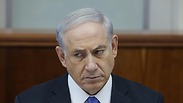
In current round of fighting, credibility is the name of the game
Analysis: A day after this round ends, we will have to ask ourselves how did an enemy like Hamas stop believing Israeli prime minister's threats.
If it is sentenced to be pushed against the wall, it will not be pushed because it doesn’t have any money to pay salaries or because it has lost its patrons in the Arab world, or because its members in the West Bank were seriously hit in the past few weeks and it has been abandoned by the Gaza street. Let it die with the Philistines.
The second option is perceived here, in Israel, as more realistic: The military wing members in Gaza conducted an intelligence assessment and reached the conclusion that the Israeli government is bluffing. The threats voiced by its senior ministers are empty threats.
If Hamas wants to reach any achievements at the end of this round, if it wishes to deter Israel from now on, it must prove to Israel how powerful it is. The missiles launched towards Tel Aviv are an opening move for negotiations.
In a nutshell, the Hamasniks had a conception. It has a factual basis: The majority in the cabinet, in the government and in the IDF echelon did not see any benefit for Israel in clashing with Hamas in Gaza, and sought to prevent a conflict. The prime minister and defense minister stood behind this policy.
When one side loses faith in the other side's threats, the result is loss of deterrence. A dangerous process began, during which Hamas allows itself to go wild and the Israeli government, which is not trigger-happy, is forced to order an expansion of the military response, including the use of ground forces.
The government isn't deluding itself that it will reach major achievements this way, but it must prove to itself, to its residents and to Hamas that it stands by its word. Credibility is the name of the game.
A day after this round ends, we will have to ask ourselves how did an enemy like Hamas stop believing the Israeli prime minister's threats. Did it happen because he threatened Iran, Hamas, the Palestinian Authority too much, and did too little, or because Hamas lost its ability to listen and understand the decision making process in Israel? Such errors have been made by Arab elements quite a few times in the past.
For now, the Israelis can be satisfied with the preparations made ahead of the Hamas offensive. The two terror attacks Hamas tried to execute – one through a tunnel near Kerem Shalom and the other from the sea, near Zikim – were thwarted without any casualties among our forces; the missiles have so far not caused any deaths or real damage to property. The Tel Aviv Metropolitan area was attacked but wasn't hit; as were Beersheba, Ashkelon and other cities. The Iron Dome system has a strategic meaning.
The IDF chief of staff visited the Gaza Division on Tuesday and approved plans. The question whether the infantry brigades deployed in the Gaza vicinity will enter populated areas in the Strip remains open. In Operation Pillar of Defense, almost two years ago, there was an impression of a ground operation, but the forces didn't really enter the cities and refugee camps. Hamas sustained damage, but wasn't battered. There wasn't any real fighting.
Foreign Minister Avigdor Lieberman demanded in the cabinet meetings that things would be done differently this time: That the IDF would go in order to strike a decisive blow. He is willing to pay the price it entails – in soldiers' lives, in the killing of civilians on both sides, in the difficult images which will be broadcast in the world.
Next time, he tells the ministers, the price will be heavier. Hamas won't have 3,000 missiles, it will have tens of thousands. In the meantime, he is in a minority: The majority in the government strives for deterrence, not a decisive blow.










